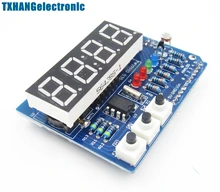Another shield for the Arduino and this is called the Tick Tock shield (I have also seen it called the starter shield) , you won’t be surprised to hear that the intention is to create a usable clock – hence the name. Here is a picture of the shield
It does contain a few components which again make it ideal for learning prior to diving in with a complete clock based example
Hardware
Piezo Buzzer
Light dependent resistor (LDR)
NTC Temperature Sensor
3 buttons
4 LEDs – 1 each of blue, green and 2 red ones
DS1307 – Real Time Clock IC;
TM1636 which is a 7 segment display driver IC which is driving 7 segment display
Pins Used
D2: LED1
D3: LED2
D4: LED3
D5: LED4
D6: Buzzer
D7: TM1636 SCLK pin;
D8: TM1636 DIO pin;
D9: K1 button
D10: K2 button
D11: K3 button
A0 : NTC Temperature Sensor
A1 : Light dependent resistor
A4 : DS1307 SDA pin
A5 : DS1307 SCL pin
None of the unused pins are available on a connector though, which would have been handy as you could have had D11,D12, A2 and A3
You can easily create a clock with various functions, you can display temperature readings on the display
Parts List
The shield comes in around $8
| Name | Link |
| Arduino Uno | UNO R3 CH340G/ATmega328P, compatible for Arduino UNO |
| Tick tock shield | RTC TM1636 DS1307 Real Time Clock Shield |
Code Examples
This is the basic RunLED example from the library link below
[codesyntax lang=”cpp”]
//-------pin definition of LEDs---------------//
#define LED4 5
#define LED3 4
#define LED2 3
#define LED1 2
void setup()
{
/*Initialization for the hardware.*/
init_pins();
}
void loop()
{
byte speed = 1;
runLED(speed);//Sweeping speed of LEDs, range from 1 to 10.
}
/*Initialization for the hardware,and should be call first*/
void init_pins()
{
pinMode(LED4, OUTPUT);
pinMode(LED3, OUTPUT);
pinMode(LED2, OUTPUT);
pinMode(LED1, OUTPUT);
turnOffAll();//Turn off all the LEDs first.
}
/*Turn on one LED*/
inline void turnOn(int pinLED)
{
digitalWrite(pinLED, HIGH);
}
/*Turn Off one LED*/
inline void turnOff(int pinLED)
{
digitalWrite(pinLED, LOW);
}
/*Turn on all the LEDs*/
inline void turnOnAll()
{
turnOn(LED4);
turnOn(LED3);
turnOn(LED2);
turnOn(LED1);
}
/*Turn off all the LEDs*/
inline void turnOffAll()
{
turnOff(LED4);
turnOff(LED3);
turnOff(LED2);
turnOff(LED1);
}
/****************************************************************/
/*Function:Sweep all LEDs. */
/*Parameter:byte speed,range from 1 to 10,1 = lowest,10 = fastest*/
/*Return: void */
void runLED(byte speed)
{
if((speed > 0)&&(speed < 11))//If the value of speed is valid?
{
uint8_t shifter = 0x01;
for(uint8_t i = 0;i < 4;i ++)
{
if(shifter&0x01)//if the lowest significant bit that represents LED1 is HIGH?
turnOn(LED1);//yes, turn on LED1.
else
turnOff(LED1);//no, turn off LED1.
if(shifter&0x02)
turnOn(LED2);
else
turnOff(LED2);
if(shifter&0x04)
turnOn(LED3);
else
turnOff(LED3);
if(shifter&0x08)
turnOn(LED4);
else
turnOff(LED4);
shifter <<= 1;//left shift 1 bit, light up the next LED and put out the current one.
delay(500/speed);
}
turnOffAll();//Turn off all LEDs after running the LEDs
}
}
[/codesyntax]
Links
Starter_Shield_Libraries-master


